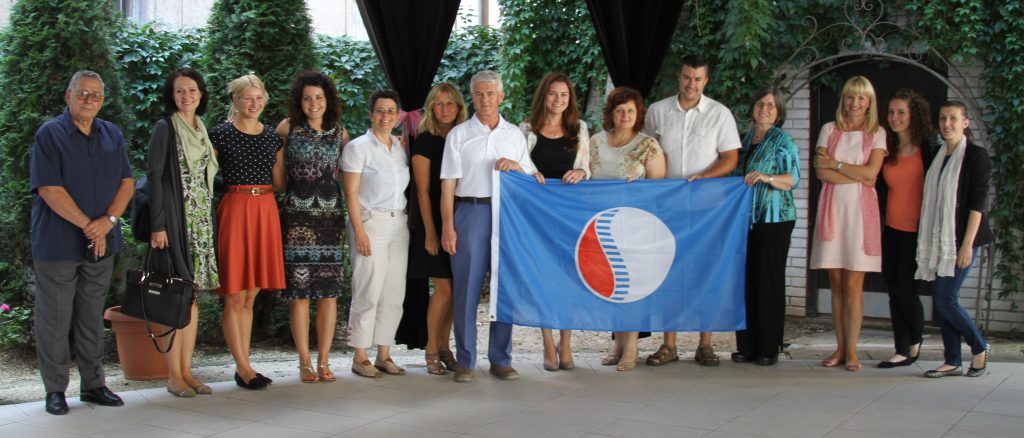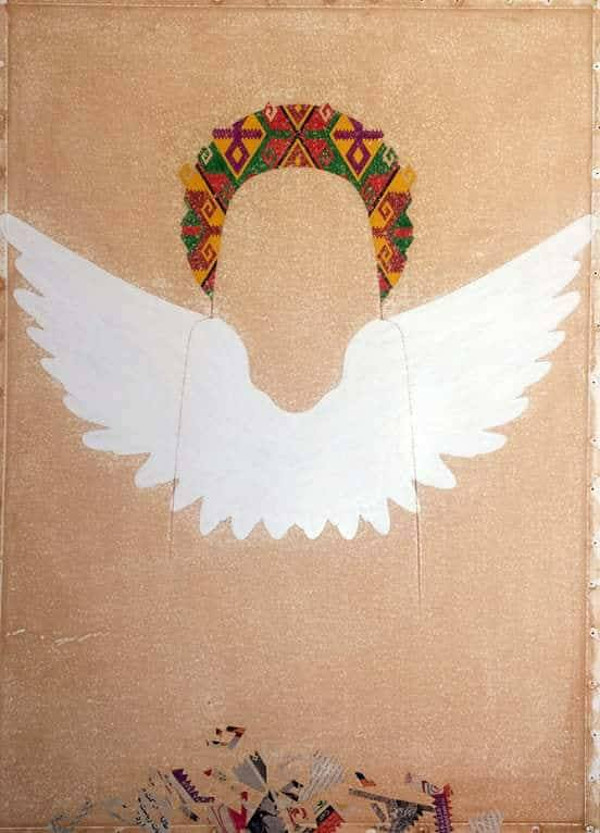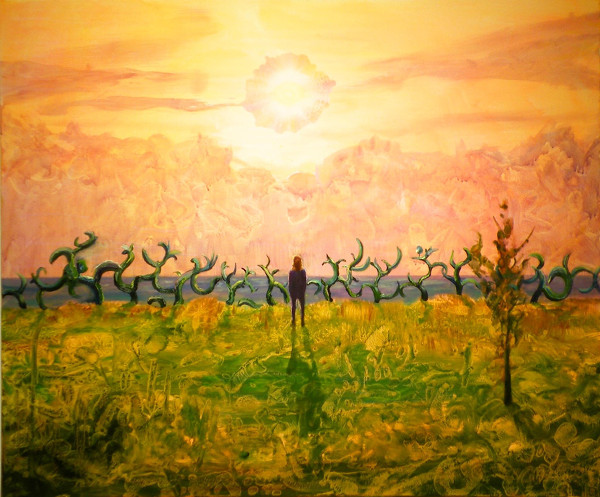|
|
|
|
Nonkilling Arts Research Committee Letter: Vol. 5, N. 3 (May-June 2021)
|
|
|
|
|
Dear NKARC members and friends,
The contributions we received for this issue of NKARC Letter are about saving the planet —championing a global deal for protecting nature and humanity. The interconnection and interdependence of our common humanity is so obvious that we ignore it at our own peril, be it pandemics, wars, genocides, climate change, refugees, or nuclear annihilation. Avoidance of extinction requires transcending our parochial visions and interests.
|
|
|
|
1. Nonkilling Poetry
The poem, "Children of the Rivers" by Rafael Carvajal, is about a world being experienced through the eyes of a migrant on the move —an iterant refugee: “My homeland is the current which carries me onwards; My skin is my flag.” See text and video below.
|
What is right,
Said Adam
Is to be born out of the mud,
In love with your native land;
To dive contentedly into its pools.
|
What is healthy,
Is to delight in the damp sands
Of ancient traditions
Chewing them over like an old piece of gum,
Which lost its sweetness
A long time past.
|
What is complete,
Is to sing with feeling
Every heroic strain of your country’s anthem,
Let yourself get carried away
Cheering on the national team through victory and defeat,
To enthusiastically wave the flag.
|
What is human,
Is to be a citizen:
This fleshy dream borne out of the mud.
|
But some of us
Are not from any place.
We were born as pebbles
To be dragged along by wild rivers.
|
I am calling to you,
Man of stone,
And to you,
Woman of jasper -
Carved by the chiselling of the winds,
Polished by the river currents
Which deposited you on the bank.
I need your hard quartz hearts.
|
They shot you with silver bullets,
They baptized you in acid,
They took your support away
They denied you headrest and pillow
They broke your alabaster bones.
|
The time is now.
The storm is rising:
Thunder will roll;
Lightning flashes will light up the ones who are hiding in the clay.
The deluge is coming: rain and hail.
To raze mountain, valley and hillside.
|
Brothers - sisters.
Shall we climb to the tip of the frozen mountain
and build the marble palace?
Or shall we go down to the delta of the sacred river
And form a jetty with our blood of gesso?
|
I am calling you,
Stony brother,
The one they called a coward.
I am calling you,
Jade sister,
Rejected and called a traitor.
|
There are bones which do not rest in their graves.
There are niches open in the cemetery.
The sweat on the traveller’s brow:
Tropical pebble
Dragged along by the river of poverty
Economic migrant
Carrying his country on his back,
Its altars and its virgins
Its foods and curious ways
Living tortured by the noble horizon
By dreams of a homeland far away.
Come to him! angel of hopeless cases,
Steal away the songs which rocked his cradle
Give him a sky with no frontiers in exchange;
Give him some shade on the pavement;
Give him the view from the rooftops;
Give him peace and take culture away.
May the soul become a passport
And let eyes restore wellbeing with the sincerity of their look.
The dead have already found their country;
Let no-one hide the living
In a casket of customs and traditions.
|
I am alone.
This land of my parents is not my land.
I am an intruder.
My face looks like other people’s faces.
My name identifies me as kin.
My blood is the inheritor of this dust.
But my blood boils against the enemies of beauty.
There is only one truth and we all know what it is,
Only one living homeland,
Only one origin.
And still, the lie keeps us away from Paradise.
|
I walk looking at the ground,
Even so, I see the beggar and the business man in his suit
And the prostitutes on the corner
And the woman who is no longer quite beautiful.
And the youngster going through his pains
And the old man blind to love
I don’t see a homeland until I see the police;
Asking the black people for their papers.
|
Senegal, Algiers, China, Peru.
You are a map, a vision, a dream.
I know your prodigal sons.
I too was a prodigal son in America.
For twenty years I savoured the ice of injustice.
Let all the border controls be opened.
Let the skies know freedom.
The future makes us grow small.
|
I am small:
Just a pebble
Dragged along by the river.
My homeland is the current which carries me onwards;
My skin is my flag.
|
— Rafael Carvajal, translated from Spanish by Amelia Burke and Rafael Carvajal
|
{ Fabricants de Futur’s video of this poem read by Rafael with Amelia’s visual art }
(More on Fabricants de Futur in Item 4, Nonkilling Project).
|
|
|
|
2. Nonkilling Fiction
|
Two contemporary novels were highly recommended, these are: Gun Island by Amitav Ghosh and A Door into Ocean by Joan Slonczewski.
|
Gun Island by Amitav Ghosh (2019)
The journey of this mystical novel steeped in reality is about zeitgeist: “a story of a world on the brink, of increasing displacement and unstoppable transition”. The journey of its Bengali-American protagonist Deen, a dealer of rare books living in New York, starts in Kolkata and ends in Venice via Los Angeles and New York. It covers a huge canvass starting with Bengal’s polluted eco-sensitive Sundarban marshes to flooded Venice canals and piazzas — local and migratory human and marine species are becoming impacted by climate change. It is a story of the humanity caught in between, struggling to adapt itself under the burden of technology and greed. Deen sums up: “The entire project had now been upended. The systems and technologies that had made those massive demographic interventions possible —ranging from armaments to the control of information— had now achieved escape velocity: they were no longer under anyone’s control... In their hearts they knew that their privileges could no longer be assured by the people and institutions they had once trusted to provide for them. The world had changed too much, too fast; the systems that were in control now did not obey any human master; they followed their own imperatives, inscrutable as demons.” (p.305) For a thoughtful interview with author Amitav Ghosh, click: https://scroll.in/article/927202/my-book-is-not-an-apocalyptic-book-at-all-i-guess-im-leaving-hope-as-a-possibility-amitav-ghosh
|
A Door into Ocean by Joan Slonczewski (1987)
Comment on this book from Wikipedia: “The novel is set in the future, on the fictional planet of Shora, a moon covered by water. The inhabitants of this planet, known as Sharers, are all female. Sharers use genetic engineering to control the ecology of their planet. They are peaceful beings who "share" — that is, they have a spiritual and linguistic union with each other and treat everyone equally... The Sharer way of nonviolence is more than spiritual. It is based on historical realities of nonviolent resistance. The author based the events of her novel on much historical research, particularly the writings of peace historian Gene Sharp. The novel includes much biological research into the evolution of innate capacities for nonviolence. For example, the participation of children in nonviolent resistance draws on deep instinctual responses found in humans and related mammals..."
|
NKARC Bosnian-Canadian Author Rifet Bahtijaragic Honoured
NKARC poet and novelist Rifet Bahtijaragic received 2020's "Little Prince" award in Bosnia. He founded the Nonkilling Balkans Forum, and also edited the Nonkilling Balkans book. The publisher-author Sime Esic on the award writes: The plaque Little Prince Rifet Bahtijaragic received is for his “outstanding contribution to international cooperation, intercultural connection and affirmation of the idea of non-killing through literary work and social engagement. The award and the plaque is presented by the society of friends of the book "Little Prince" in Tuzla, Bosnia and Herzegovina." Additionally, Bahtijarajic was nominated by Spain’s Galician Academy of Arts and Languages in December for 2021 Nobel Prize for Literature for his body of literary work.
|
|

|
|
Rifet Bahtijaragic in the middle with colleagues at CGNK Balkan
|
|
|
Bahtijaragic is author of two Nonkilling novels. Chernov's in the Storm of Life and Blood in his Eyes. Rooted in the conflicts of last century, the two works provide us a glimpse into their protagonists’ willingness to stand up in nonviolent ways to assert human dignity and personal integrity undeterred by assaults of genocidal violence. The first novel is about the Doukhobour community’s pacifism leading to their forced migration from Czar's Russia to Canada, while the second book is a tale of hate and reconciliation of two brothers on the opposite sides in the Serb-Muslim ethnic conflict in Bosnia.
|
NKARC extends best wishes to Rifet Bahtijaragic.
|
|
|
|
3. Nonkilling Short Film
|
Neighbours by Norman McLaren (1952)
|
|
|
|
4. Nonkilling Project
|
Fabricants de Futur (FdF) collectif
|
|
FdF is education and arts platform that proclaims its spirit in its banner: No Flag No Frontier. The article "Global identity, local identity" by Nuria del Viso, translated by Amelia Burke (First published in Tiempo de Actuar 26/01/2021) introduces us to FdF and its grassroots work in Europe, Africa and Middle East: “In this presentation we want to explore what it means to be a global citizen and to do this we offer a resource created by Fabricants de Futur. FdF is a collective which has spent 10 years generating open educational material (Creative Commons) in collaboration with people from diverse countries. Many of those collaborators have lived through the experience of abandoning their country of origin, usually because of armed conflicts. The collaborators talk about their experience through art (texts, poetry, drawing, painting, photography…). This activity is directed at students aged 16-18 years, however Fabricants de Futur creates many activities on different topics and for a wide age range".
|
|

|

|
|
|
5. Nonkilling Music and Song
Mosaic’s celebratory musical project: ‘LIVING TOGETHER’ - VIVRE ENSEMBLE’
Jayanta Guha from Saguenay-Lac-Saint-Jean, Quebec, Canada sent the youtube musical video, entitled "Living Together-Vivre Ensemble", a collaborative effort of music and words in 12 languages. It’s a perfect antidote to Covid isolation. Jayanta writes: “Enjoy the magic of the diversity of musical instruments alternating with the sounds of different languages that harmonise, the key element to living together.”
|
|
The artists of the Mosaic group and their extended family makes us vibrate in order to bring light with their composition "Beyond Confinement". The artists are Jayanta Guha (sabar and thon ramana), Surojit Chatterjee (flute), Khosrow Maghsoudi (tar et kamancheh), Ovide Coudé (oud), Raja Bhattacharya (sarod) Jean-François Sauriol (cello), André Machado (berimbau) et Justine Quetzal (chant and First Nation hand drum). Our hearts are touched by the sound of languages through translations of Jayanta Guha's poem 'Vivre Ensemble', first sung in French by Geneviève Labbé, followed by recitations in Innu (Marcie Michaud-Gagnon / Kevin Bacon), English (Stephen Whitney), Arabic (Souad Taha), Persian (Khatéré Talai), Bengali (Banasree Bhattacharya), Hindi (Ambica Sharma), Wolof (Marie Fall), Creole (Yveline Galla), Spanish (Karla Cynthia Garcia Martinez), Portuguese (André Machado), Polish (Tamara Anna Koziej) and Swedish (Cristina Prima Busatto). Thanks Jayanta and the Collectif Coexister au Saguenay-Lac-Saint-Jean for creating this and Michel Boissonneault who put together the video.
|
|
|
|
6. Nonkilling Reflections
|
(1) Professor S. Jeyapragasam (1949-2018) : “There Is a Thread You Follow–Identity, Journey and Destiny”, By Paul Schwartzentruber (The essay forms a chapter in an anthology, entitled Cross-Fertilizing, Roots and Routes (2019) by Ananta Kumar Giri (Editor), Palgrave Macmillan)
|
Tribute to a Gandhian teacher, activist, scholar and philosopher, the essay is written as a memorial to a dear friend and mentor Professor S. Jeyapragasam who taught Gandhian Philosophy at Madurai Kamaraj University in South India. This evocative piece, thoughtfully framed with the notion of our “irresolvable singularity of possibility” has both breadth and depth. Schwartzentruber writes: Prof. Jeyapragasam, fondly known as “Jpji” was “a man from whom I learned how singularity could be woven integrally into the weft of a life of self-giving and self-sacrifice. …., that our mutual dialogue took place within a horizon always haunted by the ghost (or ghosts) of Gandhi to whose thought and practice of nonviolence he had dedicated his life.” For his “shared dialogue” with Jpji over a decade he recalls: ”We read, spoke and wrote together endlessly on a variety of his projects (and he had many on the go) and all the while he continually and gently explained to me what Gandhi had meant by such ideas as aparigraha (non-possession) and how that ‘non-grasping’ formed the basis for satyagraha (truth-force or ‘grasping the true’)"...
|
(2) This is what will finally transform the South: Opinion by W. Ralph Eubanks: (W. Ralph Eubanks is the author of the new book A Place Like Mississippi: A Journey Through a Real and Imagined Literary Landscape, Timber Press). Eubank’s essay is about a new generation of American Southern writers — who are of varying ethnicities providing new cultural scripts for what it means to be Southern. He writes: “From where I sit as a literature and Southern Studies professor, political change begins with active engagement with ideas. In every class I teach, my unspoken goal is for students to understand how storytelling holds the power to change the way we look at the world.”
|
(3) Human Trafficking in Bangladesh by Rashida Khanam: A professor of political science, NKARC colleague Dr. Khanam writes: “Almost 10 million Bangladeshi migrants work across the world. A UNICEF report states that, approximately 400 women and children in Bangladesh are victims of trafficking every month. According to a report, approximately 3,000,000 Bangladeshi children and women have been trafficked out of the country in the last 10 years. A Pakistan based organization, Lawyers for Human Rights and Legal Aid’s report shows that nearly 200,000 Bangladeshi women and girls were sold in Pakistan. The statistics highlight how grave the human trafficking situation is in Bangladesh…”
|
|
|
|
7. CGNK Updates
- Busy month for CGNK at the United Nations Human Rights Council by Joám Evans Pim
“It started with the biennial debate on the death penalty, the topic being this time the deterrent effect of such a penalty. Our representative at the UN-Geneva, Christophe Barbey, recalled that the main preventive effect needed to preserve life is to value life and that therefore States that practice the death penalty also violate their duty of exemplarity. He then recalled that by promising to “leave no one behind” through the 2030 Sustainable Development Goals, the unanimous member States of the UN left no possible space for the existence of the death penalty, thus calling for the worldwide end of this cruel punishment, as soon as may be, but for 2030….”
- GLOBAL NONKILLING DAY - JUNE 28
The Global Nonkilling Day (June 28) is celebrated to work towards a world in which humans no longer kill. Amidst continued killing following the 20th Century, this Day arises out of new understanding that a killing- free world is possible. It is possible for humans to stop killing each other from homicide to genocide, terrorism, suicide and mass murder.
A killing-free world is a measurable goal, the methods and means of realization are open to infinite human creativity.
On this Day, through small, creative, and catalytic in partnership with individuals and institutions locally and worldwide, let us aim to combine and share the spirit, science, skills, arts, institutions and resources of all including the Center for Global Nonkilling (CGNK) to new and renewed leadership. This is for change towards a just, killing-free world in which everyone has the right not to be killed and the responsibility not to kill others.
Work of CGNK on its website (www.nonkilling.org) points to examples of small, creative and catalytic partnerships through volunteer effort and initiatives. The Nonkilling goal can be reached by globally advancing nonkilling knowledge and skills, incorporating them into education and training, and applying them in individual and social actions for the well-being of all.
The Global Nonkilling Day was established on 28 June 2009 on Professor Glenn Durland Paige's 80th Birthday to commemorate his pioneering Nonkilling Paradigm project. An American social science innovator and political scientist at the University of Hawai‘i, Glenn D. Paige (28 June 1929 - 22 January 2017) is founder of the Center for Global Nonkilling, a ECOSOC NGO.
"NO MORE KILLING, VIOLENCE IS PREVENTABLE"
|
|
|
8. Nonkilling Journalism
|
|
|
Last Word
An anticipatory view
Humanity will keep suffering
Pandemic will keep killing
Unless
Faith Hope Global Unity
Will strengthen solidarity
Nonviolence and Nonkilling
will help Human Health resist
and persist toward a sustainable community
of dignifiers in harmony with Nature
— Francisco Gomes de Matos. A peace linguist, Recife Brazil
|
|
|
|
My deep gratitude to all who contributed and pointed to the material for the Letter.
I look forward as always to your inspirations, suggestions and comments.
|
|
"Nonkilling Culture crosses all the lines." —Glenn D. Paige
|
Nonkilling is THE measure of Human progress
|
[THIS IS AN INTERNAL NEWSLETTER OF THE NKARC. COPYRIGHT FOR ALL MATERIAL IN THE NEWSLETTER REMAINS PROPERTY OF THE SOURCES/WRITERS/ART CREATORS]
|
|
|
|
Stay in contact also on Social Networks
- Please feel free to contact NKARC Letter's coordinator at billbhaneja@nonkilling.org.
- You can also follow the Center for Global Nonkilling at these social networks:
|
 
|
|
|
|
|
|